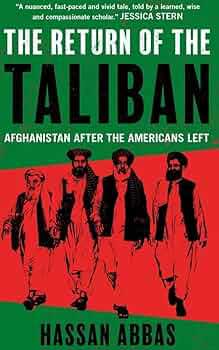Hassan Abbas’s book, “The Return of Taliban: Afghanistan: After the Americans Left”, delivers an in-depth analysis of events leading to Taliban’s takeover following the U.S. withdrawal from Afghanistan in 2021. The book comprises six chapters that examine the new regime’s composition and structure, religious ideology, international relations, and the challenges it encounters.
Following the United States’ withdrawal from Afghanistan, the geopolitical landscape of the region has experienced a profound transformation that has captured the interest of both academics and policymakers. This phenomenon has significant ramifications for the broader spectrum of debates in the discipline of international relations since it necessitates a re-evaluation of regional power dynamics, the impact of external actors on a state’s build-up, and a reassessment of key theoretical frameworks.


Hassan Abbas’s book “The Return of the Taliban,” describes the evolutionary process of Taliban in Afghanistan from their emergence in 1994, to their down fall post 9/11 and resurgence after 20 years. The author highlighted the impact of Sunni-Hanfi-Deobandi religious ideology and Pashtun ethnic culture, contestation of regional powers and the divergences within Taliban groups. Abbas provides a lens to explore the internal fissures in Ghani’s government, its exclusion from US-Taliban negotiations and lacklustre competence of Afghan National Army and other state organs. He also analysed how Taliban strategized their return to power through hard bargain on one end of the spectrum and increased violence on the other end while exploiting social media for perception management and creating narratives.
In the aftermath of US-Taliban secret deals, the author examines the complexities of state-building in Afghanistan giving a detailed description of transition from warriors to governors, and mentions “The Taliban have not changed much in ideological sense but today’s Taliban are different from the last time they were in power”. While discussing the evolution of Taliban leadership and their road to Kabul, in his book, Hassan Abbas ponders that one of the biggest challenges for Taliban leadership was to win the hearts of the people of Afghanistan post-US withdrawal.
The author highlights the key challenges faced by the Taliban regime such choice of right leaders in Pashtun heavy cabinet (ignoring other ethnicities), policies toward women, financial instability, and consolidating legitimacy of regime in the presence of global isolation. Abbas summarised Taliban Theory of Governance referring to Mullah Hibatullah’s book which provided essentials of Taliban’s world view and laid out philosophy and public policy for post-US Afghanistan. The author also broached on Taliban’s aggressive and militaristic Deoband (revivalist) outlook evolved from its genesis in colonial India and its cross road with Salfism and Pashtunwali. Dwelling on Taliban’s religious narrative, author questions if change in current generation of leadership would slowly end the Taliban as we know. The author also posits a detail description of TTP and ISKP evolution and presence in Afghanistan and its impact on security landscape within and outside Afghanistan.
Abbas mentions of the broken promises made during Doha negotiations especially in case of women seeking economic opportunities, continuation of girl child’s education and displacement of Hazaras from ancestral lands vindicating return of Taliban’s erstwhile hard-line stance. Amidst all the psycho-social turmoil, under the new regime, Afghan nation is economically destitute due seizures of foreign economic support and freezing of Afghan Government funds drastically shrinking the economy. The political fractures and intra-Taliban rivalries has accentuated the governance dilemmas leading to parallel power centres contesting for control and influence.
Diplomatically, Abbas mentions that Taliban Regime remains shrouded in cloak of isolation. Though formal communication channels with few countries established, Afghanistan largely remains cut off from rest of the world. The Regime’s diplomatic relations with its neighbours and other regional countries remain subjected to mistrust and scepticism over Taliban’s intent to adhere to promises made, material capacity and political will to deny space to terrorist organisations perusing safe havens in Afghanistan. Even with Pakistan, contrary to obvious, all is not well between Taliban and Pakistan. The centre of quagmire being Kabul’s inability to pursue TTP on Afghan soil, triggering a resurgence of terrorism in Pakistan.
The author has drawn insightful conclusions and thorough analysis. He concludes that the challenges being faced by Taliban regime are primarily rooted in their inflexibility and dogmatism. Internal ethnic fissures, potential threats like ISK, and complex relationships in the region and beyond contributing to a precarious regional security landscape. Moreover, the emergence of a new generation within the Taliban, influenced by global movements and technology, presents an opportunity for policy evolution, especially in religious inclusivity. Financial management is identified as a pivotal factor in the Taliban’s success, impacting their ability to provide security and prevent public unrest.
Hassan Abbas’s book is highly recommended to international scholars, policy practitioners and decision makers pursuing a holistic grasp of a comprehensive understanding of complex internal and external dynamics unravelling in Afghanistan post U.S. withdrawal. This book provides an invaluable exploration of the multifaceted challenges the Taliban are confronted with. By delving into the political, social, and economic dimensions, the author offers nuanced insights that can greatly enhance comprehension of the issue at both national as well as regional levels. The book serves as an indispensable resource for policymakers and scholars alike for crafting informed strategies and fostering a deeper understanding of the ongoing developments in the region post-US exit.
